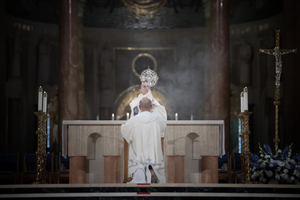Vatican Worship Dicastery’s Meeting to Focus on Proper Liturgical Formation, Implementation
The Dicastery for Divine Worship and the Discipline of the Sacraments will hold its annual plenary assembly Feb. 6-9 at the Jesuit Curia in Rome.

The Dicastery for Divine Worship and the Discipline of the Sacraments will hold its annual plenary assembly Feb. 6-9 at the Jesuit Curia in Rome.
“The intent is to delve into the theme of liturgical formation 60 years after the promulgation of the Apostolic Constitution Sacrosanctum Concilium, tracing the practical paths on the indications contained in [Pope Francis’] apostolic letter Desiderio Desideravi, published in June 2022,” a press release from the dicastery stated.
The 2022 letter addressed what the Holy Father called “the liturgical formation of the people of God.” Quoting from Desiderio Desideravi, the dicastery’s statement this week said that the “non-acceptance of the liturgical reform … distracts us from the obligation of finding responses” to questions regarding reform of liturgy.
“How do we continue to let ourselves be amazed at what happens in the celebration under our very eyes?” the statement said, quoting the Holy Father. “We are in need of a serious and dynamic liturgical formation.”
The assembly will be composed of various working groups in order to address the “liturgical formation from Sacrosanctum Concilium to Desiderio Desideravi” for ordained ministers as well as “liturgical training courses for the people of God.” It will also “provide bishops with practical suggestions for developing pastoral projects in their dioceses with the aim of putting into practice the reflections of the papal document.”
The members of the plenary assembly will also be received by the Holy Father in an audience.
Sacrosanctum Concilium, or the constitution on the sacred liturgy, promulgated by St. Paul VI on Dec. 4, 1963, focused on laying the groundwork for Paul VI’s 1969 apostolic constitution Missale Romanum, which introduced the ordinary form of the Mass, also known as the Novus Ordo.
The dicastery’s meeting will seek to bring a synthesis between the seminal conciliar document and Desiderio Desideravi, the latter of which highlighted the centrality of the liturgy in the life of Catholics while also underscoring the need to be faithful to the liturgical forms of the Second Vatican Council.
Emphasizing the importance of “a serious and dynamic liturgical formation,” Pope Francis noted in that document that “it would be trivial to read the tensions, unfortunately present around the celebration, as a simple divergence between different tastes concerning a particular ritual form.”
The Pope also stressed that the principles stated in Sacrosanctum Concilium have been fundamental for the reform of the liturgy and continue to be fundamental for the promotion of its “full, conscious, active, and fruitful celebration.”
A June 2022 press release from the dicastery noted that the Pontiff’s letter emerged from “the propositions that resulted from the plenary session of the Congregation for Divine Worship and the Discipline of the Sacraments” in February 2019.













